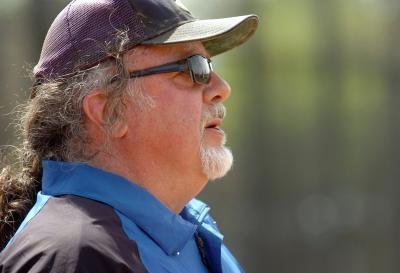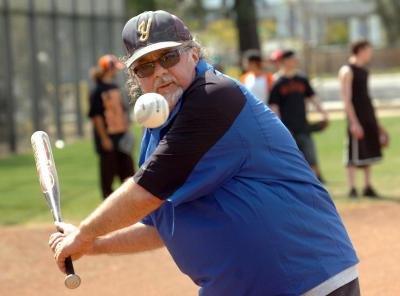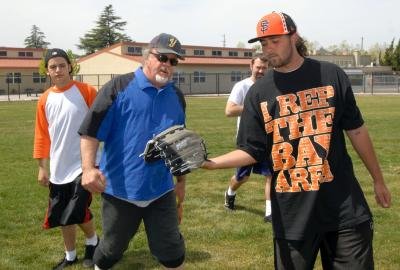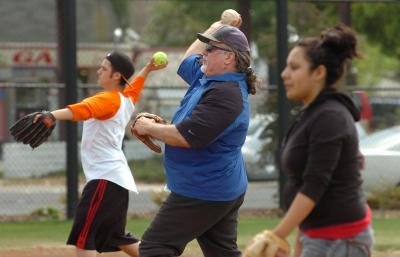April 13, 2009
 Just
imagine.
Just
imagine.
This is the two-line refrain to which Ron Redding keeps coming back. Just imagine what it might be like to grow up and be treated as someone to be discarded. Just imagine a future that seems so bleak prison can seem like a promising option.
Now, just imagine the wiring it takes to stand among such souls, intent on changing their thinking. Redding has made it his life's work. "All kids," he says, "can be saved." And, like the memorable movie character Mr. Holland, Redding will use "any means necessary" to save them.
Redding has taught government, civics and music for the past 19 years at Olympic High School, an alternative school in Concord that houses, as colleague Jackie Griffin puts it, "the most unfortunate of the unfortunate."
Several years back, Redding added softball to his plate. He formed an intramural team, starting the project with a bat, glove and a couple of balls. This season, he will turn over the coaching duties to former assistant Jesse Forsland — "he'll be a great coach," Redding says — and the team Forsland takes over says as much about Redding as anything.
Today, Olympic plays in the California Continuation Education Association. It has a new softball field — the result of Redding's ability "to shed positive light on the school," Griffin says — and has developed relationships with several city softball teams, including one composed of adults 50 and older.
All are important things, but perhaps not as important
as the message they have allowed Redding to deliver: Trust can be a good thing.
"It was a life-changing experience for me," says former College Park High
baseball coach Tyler Derr, who played for Redding. "But it wasn't just softball.
He taught everything very well. He was very straight up with all of us. He
teaches life and how to define success in it."
Redding's definition of success may seem old-fashioned. It's not about money,
fame or status — initially, he was reluctant to share his story — but rather
about self-empowerment, achievement and stability.
In one sense, he has been surrounded by it more than, as he says, "a person
should reasonably expect." He and Joan, his wife of 26 years, have raised
daughters Jennifer, 26, and Allison, 25. The extended family, which includes
former students and folks that Redding has befriended, is more than one can
count.
"If you're serious about showing him you want to turn it around," says Bud
Farthing, a chemical cleaning specialist who graduated from Olympic in 2002,
"then he's in your corner for however long you need him."
Redding is passionate about his calling. He uses a "Jeopardy"-style format with
his students to teach them civics. He has run into students during his daily
bicycle rides and quizzed them on what is happening with the government. His
love of music is such that he enlisted help from former and current students to
stage a show in downtown Concord this past summer.
"Jennifer one time at a family gathering told Allison's new boyfriend about how
sometimes her dad would pick her up at school in a pilgrim outfit or an elf's
outfit," says Rebecca Smith, Redding's sister and principal at Monte Vista High
in Danville. "He's not afraid to stand out or laugh at himself. Kids may laugh
at him. But they also learn."
In other words, Redding considers himself not a teacher of softball or
government or music or civics, but rather of life. So it is, he says, that his
greatest thrills came not from the four CCEA District IV championships Olympic's
softball team has won, but rather from when a former student enters the voting
booth for the first time, "armed with knowledge they're learning here."
"Ron is absolutely a great teacher," says U.S. Rep. George Miller, D-Martinez,
who has worked closely with Redding and talks to his classes annually. "In 23
years, Ron has never lost his 'touch' in caring about young people, reaching out
to them and giving them purpose. He really makes the classroom come alive and
... successfully connects the dots between the challenges his students face in
the classroom, at home, on the street and with the governmental structures in
place to serve them."
Redding says he was inspired by his mother, Nawatha, who taught in the Mt.
Diablo Unified School District for 32 years.
"No matter what she was doing, it always was for somebody else," he says.
"Whether it was the way she was teaching kids or doing work in the house, it was
always something that was designed to make people happy."
Redding initially set out to be an attorney. However, when the curriculum at
Oklahoma Military Academy included math classes he "just didn't want to deal
with," he turned to teaching. The Vietnam War, which ended many young lives,
also played a role in his decision, Redding says. When he entered the classroom,
Redding called on skills learned from his father.
"Mom and dad were both pretty strong people," Smith says. "Dad never raised a
voice, but he could convey a message by letting you reach a conclusion on your
own. ... So it was very consistent, which doesn't happen a lot anymore, and Ron
was able to take that with him."
Indeed, most of Redding's students insist that his effectiveness stems primarily
from his consistency. "Some of these kids are on probation. Some of them are not
on probation but parole," Griffin says. "These are the unfortunates. ... These
are big, angry kids here."
Farthing says stepping into Redding's class was his first step on a path leading
to a productive life.
"I wanted to play baseball, and I got behind in my grades and couldn't play," he
said. "So I quit. ... But what I learned here, and especially from Mr. Redding,
is that just because something doesn't work out, that doesn't mean you quit on
life. Something good can come out of everything."
Indeed, plenty of good has come out of Redding's classroom at Olympic.
"The main job is to convince these kids that they are every bit as capable as
any other kid," Redding says. "Getting somebody to feel good about themselves
and just feel good in general can open so many doors. ... Most kids are really
good kids. They just don't know it."


